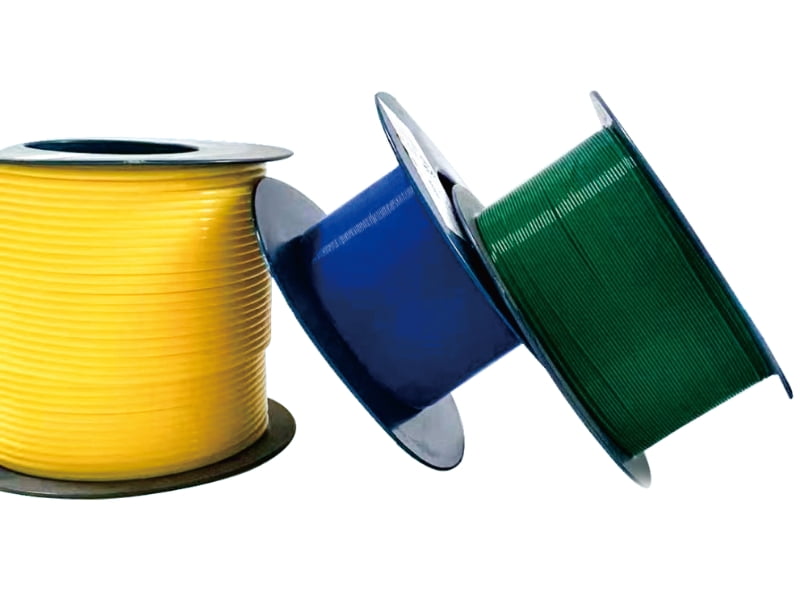PTFE (Polytetrafluoroethylene) tubes are high-performance tubes made from polytetrafluoroethylene, a polymer known for its outstanding chemical, physical, and mechanical properties. PTFE Tubes are widely used across various industries due to their exceptional resistance to heat, chemicals, low friction, and other unique qualities. These tubes are ideal for a wide range of demanding applications, from industrial manufacturing to medical devices.
1.High Temperature Resistance:
PTFE tubes can withstand extreme temperature conditions. They typically maintain their physical properties within a temperature range of -200°C to +260°C. This makes them suitable for applications involving high-temperature fluids or gases where other materials might degrade.
2.Excellent Chemical Resistance:
One of the standout properties of PTFE tubes is their superb chemical resistance. They are impervious to most acids, bases, solvents, oils, and other aggressive chemicals, making them ideal for use in industries like chemical processing, pharmaceuticals, and food production.
3.Low Friction Coefficient:
PTFE tubes have an extremely low coefficient of friction, which results in superior sliding properties. This is beneficial for applications where fluid transfer requires minimal resistance, such as in precision fluid handling or cooling systems. The low friction also helps reduce wear and tear in mechanical systems.
4.Electrical Insulation Properties:
PTFE is an excellent electrical insulator, which makes PTFE tubes suitable for electrical and electronic applications. They are widely used for wire insulation, protective coverings, and cable management, especially in high-voltage or sensitive electronic devices.
5.Durability and Strength:
Despite being relatively soft, PTFE tubes are strong and resilient, offering high tensile strength and impact resistance. They can withstand external pressure and impact without breaking or cracking, making them ideal for demanding industrial environments.
6.Non-Stick Surface:
PTFE’s non-stick surface prevents dirt, oil, and other substances from adhering to the tube’s surface, making it highly resistant to contamination. This property is particularly useful in industries that require a clean and sterile environment, such as food processing and medical applications.
7.Non-Toxic and Environmentally Safe:
PTFE is non-toxic, which makes it a safe choice for food contact and medical applications. Its chemical inertness means it does not release harmful substances, ensuring safety in applications that involve direct human contact.
Specification
Lingfree series PTFE casing is made of high-quality polytetrafluoroethylene(PTFE is commonly known as Teflon, plastic king) resin, extruded and sinteredIt has passed the US UL certification (Certification No.E352366), and its voltagegradeis LF-L(150V)LF_T(300V)LF_S (600V).The product has the advantagesof high temperature resistance, high pressure resistance, corrosion resistancewear resistance, good self lubrication,etc. Widely used in machinery, electronicappliances, automotive, aerospace,chemical, communications and other fields.
Usage
High and low temperature resistance, continuous usetemperature(-80℃~260 ℃);
Corrosion resistance (resistance to strong acid, alkali,chemical reagent, oil);
High voltage resistance (26KV/mm).Standard color:transparent.
Characteristics

Dimension

Applications of PTFE Tubes
PTFE tubes are used in a variety of industries and applications, including:
1. Chemical and Petrochemical Industry
Chemical Processing: PTFE tubes are widely used for piping, hose, and fluid transfer systems that transport aggressive chemicals and corrosive fluids. Their resistance to acids, bases, and solvents ensures that they can handle the harshest chemical environments without degradation.
Petrochemical Industry: PTFE tubes are also used in fuel transfer, oil pipelines, and chemical reactors, offering reliable and long-lasting performance in high-stress conditions.
2. Food and Pharmaceutical Industries
Food Processing: PTFE tubes are safe for food contact and can withstand high temperatures, making them ideal for food-grade pipes, conveyor belts, and discharge tubes in food processing lines.
Medical Devices: Due to their biocompatibility, PTFE tubes are often used in medical tubing, catheters, surgical instruments, and pharmaceutical equipment that require sterilization and cleanliness.
3. Electronics and Electrical Applications
Electrical Insulation: PTFE tubes are used in cables, wires, and electrical connectors for high-voltage or high-frequency applications due to their excellent electrical insulating properties.
Electronic Components: PTFE tubes are also used to protect sensitive components and circuits, ensuring durability and long-term performance in electronic devices.
4. Automotive and Aerospace Industries
Automotive Systems: PTFE tubes are used in automotive fuel lines, hydraulic systems, and cooling systems because of their ability to withstand high temperatures and pressure without degrading.
Aerospace: In aerospace applications, PTFE tubes are used for fuel transfer, aircraft hydraulic systems, and electrical insulation, where reliability and resistance to harsh environments are crucial.
5. Medical and Laboratory Applications
Medical Devices: PTFE tubes are commonly used in medical tubing for intravenous systems, dialysis tubing, and respiratory tubes due to their biocompatibility, resistance to sterilization, and non-toxic nature.
Laboratory Equipment: PTFE tubes are used in laboratory setups for handling aggressive chemicals, gases, and liquids, thanks to their chemical resistance and ease of cleaning.
Specifications and Customization Options
Diameter Range: PTFE tubes are available in a wide range of inner and outer diameters, from small-scale applications like microfluidics to industrial uses with larger diameters.
Wall Thickness: Depending on the application, PTFE tubes can be manufactured with varying wall thicknesses to meet the specific pressure and durability requirements of the system.
Length: PTFE tubes can be custom-cut to different lengths, depending on the needs of the project or application.
Color Options: PTFE tubes are typically white or translucent, but they can also be manufactured in different colors to meet specific application needs.




 English
English




